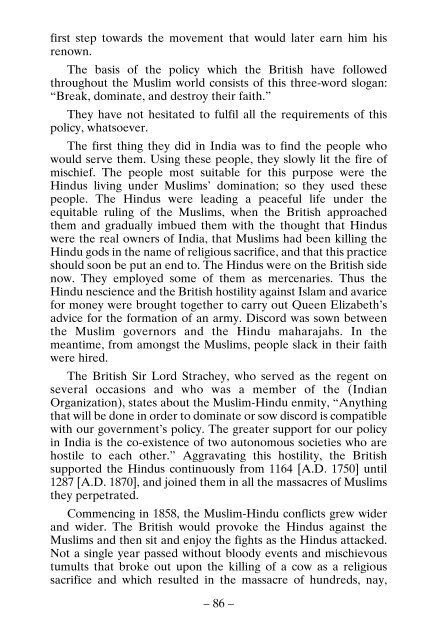Confessions Of A British Spy
Muhammad of Najd was the sort I had been looking for. For his scorn for the time’s scholars, his slighting even the (earliest) four Khalîfas, his having an independent view in understanding the Qur’ân and the Sunna were his most vulnerable points to hunt and obtain him. So different this conceited youngster was from that Ahmed Efendi who had taught me in Istanbul! That scholar, like his predecessors, was reminiscent of a mountain. No power would be able to move him. Whenever he mentioned the name of Abû Hanîfa, he would stand up, go and make an ablution. Whenever he meant to hold the book of Hadîth named he would, again, make an ablution. The Sunnîs trust this book very much. Muhammed of Najd, on the other hand, disdained Abû Hanîfa very much. He would say, “I know better than Abû Hanîfa did. In addition, according to him, half of the book of wrong.
Muhammad of Najd was the sort I had been looking for. For
his scorn for the time’s scholars, his slighting even the (earliest)
four Khalîfas, his having an independent view in understanding
the Qur’ân and the Sunna were his most vulnerable points to hunt
and obtain him. So different this conceited youngster was from
that Ahmed Efendi who had taught me in Istanbul! That scholar,
like his predecessors, was reminiscent of a mountain. No power
would be able to move him. Whenever he mentioned the name of
Abû Hanîfa, he would stand up, go and make an ablution.
Whenever he meant to hold the book of Hadîth named he would, again, make an ablution. The Sunnîs trust this book
very much.
Muhammed of Najd, on the other hand, disdained Abû Hanîfa
very much. He would say, “I know better than Abû Hanîfa did.
In addition, according to him, half of the book of wrong.
You also want an ePaper? Increase the reach of your titles
YUMPU automatically turns print PDFs into web optimized ePapers that Google loves.
first step towards the movement that would later earn him his<br />
renown.<br />
The basis of the policy which the <strong>British</strong> have followed<br />
throughout the Muslim world consists of this three-word slogan:<br />
“Break, dominate, and destroy their faith.”<br />
They have not hesitated to fulfil all the requirements of this<br />
policy, whatsoever.<br />
The first thing they did in India was to find the people who<br />
would serve them. Using these people, they slowly lit the fire of<br />
mischief. The people most suitable for this purpose were the<br />
Hindus living under Muslims’ domination; so they used these<br />
people. The Hindus were leading a peaceful life under the<br />
equitable ruling of the Muslims, when the <strong>British</strong> approached<br />
them and gradually imbued them with the thought that Hindus<br />
were the real owners of India, that Muslims had been killing the<br />
Hindu gods in the name of religious sacrifice, and that this practice<br />
should soon be put an end to. The Hindus were on the <strong>British</strong> side<br />
now. They employed some of them as mercenaries. Thus the<br />
Hindu nescience and the <strong>British</strong> hostility against Islam and avarice<br />
for money were brought together to carry out Queen Elizabeth’s<br />
advice for the formation of an army. Discord was sown between<br />
the Muslim governors and the Hindu maharajahs. In the<br />
meantime, from amongst the Muslims, people slack in their faith<br />
were hired.<br />
The <strong>British</strong> Sir Lord Strachey, who served as the regent on<br />
several occasions and who was a member of the (Indian<br />
Organization), states about the Muslim-Hindu enmity, “Anything<br />
that will be done in order to dominate or sow discord is compatible<br />
with our government’s policy. The greater support for our policy<br />
in India is the co-existence of two autonomous societies who are<br />
hostile to each other.” Aggravating this hostility, the <strong>British</strong><br />
supported the Hindus continuously from 1164 [A.D. 1750] until<br />
1287 [A.D. 1870], and joined them in all the massacres of Muslims<br />
they perpetrated.<br />
Commencing in 1858, the Muslim-Hindu conflicts grew wider<br />
and wider. The <strong>British</strong> would provoke the Hindus against the<br />
Muslims and then sit and enjoy the fights as the Hindus attacked.<br />
Not a single year passed without bloody events and mischievous<br />
tumults that broke out upon the killing of a cow as a religious<br />
sacrifice and which resulted in the massacre of hundreds, nay,<br />
– 86 –


